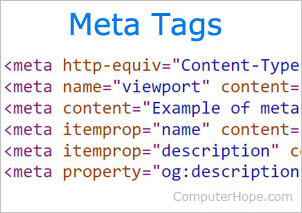Meta tag

In HTML (hypertext markup language), meta tags or meta elements are tags placed in the head section of your code that help define the contents of a web page. For example, a description meta tag is used by Internet search engines to display a description of your page in their search results. Each meta element must contain an opening and closing <meta> tag. The sections below list and describe the different types of meta tags.
Today, the most important meta tags for web developers are those for Content-Type and Description.
Content-Type meta tag
<meta content="text/html; charset=utf-8" http-equiv="Content-Type">
Identifies the content type and charset of the web page as defines how to show the page.
Although charset can be specified in a meta tag, if you can access the .htaccess file, define it there instead. That way, it doesn't have to be specified in every web page.
No-cache meta tag
<meta http-equiv="cache-control" content="no-cache">
Lets the Internet browser know it should not cache the page. Using this tag ensures that the latest information is displayed to the visitor. It is only recommended that this tag be used on a page that is frequently updated since it increases loading time.
Audience meta tag
<meta name="audience" content="all">
Used with parental control software and robots to control the ages of viewers who may visit the page. This meta tag is not that important, but can be useful for any adult related pages.
Author meta tag
<meta name="author" content="www.computerhope.com">
Description of the author of the page.
Content-Language meta tag
<meta name="Content-Language" content="english">
The language the page is written. The example above specifies English. Today, this tag can be skipped if you classify the language in HTML tag. For example, <html lang="en"> at the beginning of your page.
Description meta tag
<meta name="description" content="Helping you with ALL your computer questions">
The description meta tag covers what type of information the web page contains. The description meta tag is the most important tag, used by a search engine to rank your page in the search results. The description length should be between 150 and 160 characters.
Generator meta tag
<meta name="GENERATOR" content="Microsoft FrontPage 4.0">
The software used to generate the web page.
Keywords meta tag
<meta name="keywords" content="computer, technical, free, help, support">
Keywords separated by commas that help describe what the page contains. Because of abuse, many search engines, including Google no longer look at the keywords. Many sites, including Computer Hope, no longer include the keywords meta tag on any of their pages.
Page-topic meta tag
<meta name="page-topic" content="Free Computer help">
Topic of the page, used by some search engines. Not all pages need this.
Page-type meta tag
<meta name="page-type" content="Technical Support">
The page type, used by some search engines. Not all pages need this.
ProgID meta tag
<meta name="ProgId" content="FrontPage.Editor.Document">
Program used to edit the file, like the generator.
Publisher meta tag
<meta name="publisher" content="Computer Hope">
The publisher of the web page.
Revisit-after meta tag
<meta name="revisit-after" content="15 days">
Lets web robots know how frequently to index the page. It is recommended that the robots.txt file be used instead of meta tags to direct web robots.
Robots meta tag
<meta name="ROBOTS" content="Index, ALL">
This line lets any web robots know which pages to index. It is recommended that the robots.txt file be used instead of meta tags to direct web robots.
<meta name="ROBOTS" content="Index, FOLLOW">
This line is a notice to web robots to follow all links on the page.
Should I use "meta tag" or "metatag" in my writing?
The word "meta tag" should be two words separated by a space and not written as one word or hyphenated.
Browser, HTML, HTML terms, Internet terms, Open Graph, Programming terms, Robots.txt, Tag
